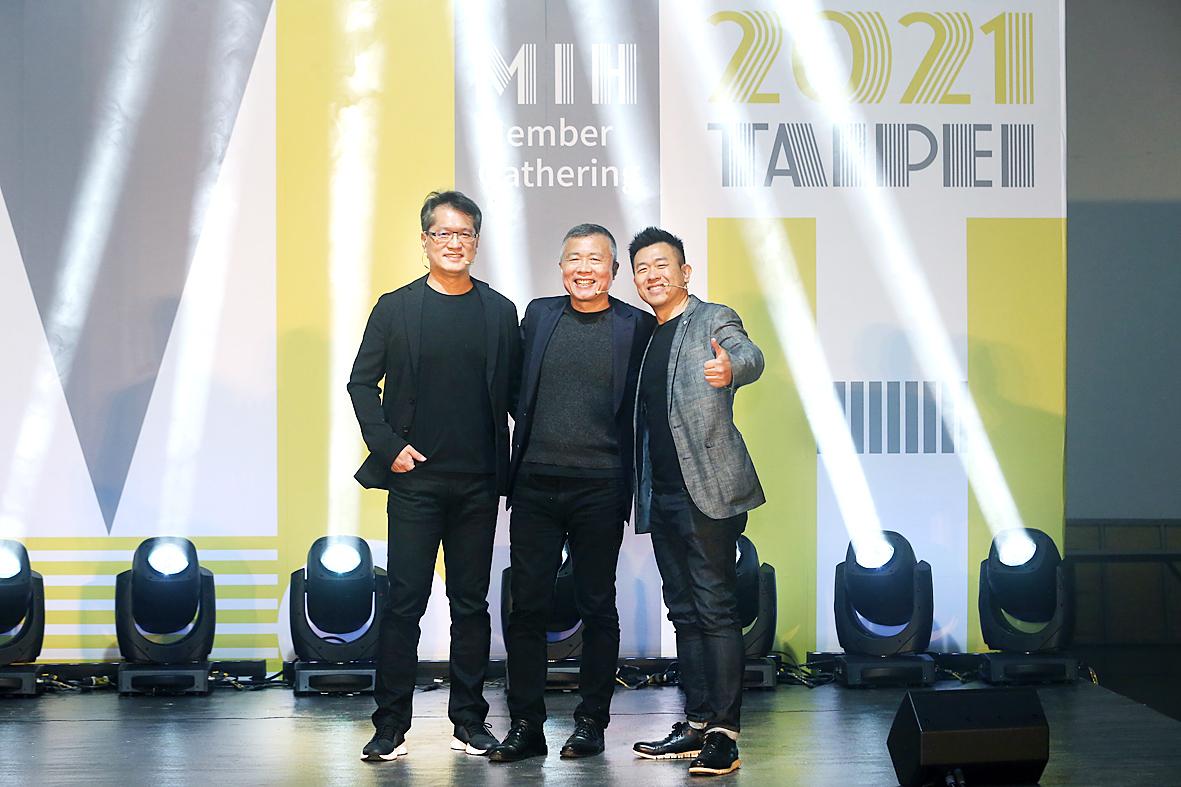Hon Hai Precision Industry Co’s (鴻海精密) MIH platform for electric vehicles (EVs) is to become an independent business unit in July, the company said at the first MIH Open Platform Alliance membership meeting in Taipei yesterday.
More than 1,200 companies in the EV supply chain have joined the alliance since its inception in October last year.
Hon Hai chairman Young Liu (劉揚偉) said that the firm’s goal is to consolidate Taiwan’s EV component makers so that they can cooperate with each other.

Photo: Chen Rou-chen, Taipei Times
“Due to Taiwan’s limited domestic market, it is hard to develop a business-to-consumer model,” Liu said. “However, a platform to bring together all of the nation’s talent on a business-to-business basis is perfect for the development of EVs.”
The development of “software-defined vehicles” was central to the member-only meeting in the Songshan Tobacco Factory in Taipei, which was livestreamed online.
“In the future, you will be able to develop 80 percent of an EV’s functions on the cloud,” Hon Hai chief technology officer William Wei (魏國章) said.
“Our goal is to provide vehicle developers with a complete stack development environment that mimics today’s development environment for consumer electronics,” Wei said. “It will be like what we had for desktop computers for the past 20 years and for smartphones in the past 10 years.”
Wei said that the EV development cycle can be shortened, from five years to two-and-a-half years, and development costs and risks reduced through cloud-based systems.
EV design can be streamlined by “pushing the whole system layer to the application layer,” Wei said.
“We push the domain of battery management into the application layer so that everybody can join in disrupting the space,” he said.
Among the MIH members is Tony Lin (林東閔), chief executive officer of Aeon Motor Co (宏佳騰), a maker of electric scooters.
Lin said that through flexibility in EV development, a whole new mobility market would emerge.
The MIH platform can accommodate vehicles as diverse as busses and microvehicles, he said.
“When you call a Uber you are hiring a five-person sedan with a driver to carry one passenger,” Lin said, referring to the California-based ride-hailing service.
“What if in the future you can just hire a 1-seater autonomous car?” Lin said. “Taiwan needs this alliance to bring us together so we can be seen by the world.”

MULTIFACETED: A task force has analyzed possible scenarios and created responses to assist domestic industries in dealing with US tariffs, the economics minister said The Executive Yuan is tomorrow to announce countermeasures to US President Donald Trump’s planned reciprocal tariffs, although the details of the plan would not be made public until Monday next week, Minister of Economic Affairs J.W. Kuo (郭智輝) said yesterday. The Cabinet established an economic and trade task force in November last year to deal with US trade and tariff related issues, Kuo told reporters outside the legislature in Taipei. The task force has been analyzing and evaluating all kinds of scenarios to identify suitable responses and determine how best to assist domestic industries in managing the effects of Trump’s tariffs, he

TIGHT-LIPPED: UMC said it had no merger plans at the moment, after Nikkei Asia reported that the firm and GlobalFoundries were considering restarting merger talks United Microelectronics Corp (UMC, 聯電), the world’s No. 4 contract chipmaker, yesterday launched a new US$5 billion 12-inch chip factory in Singapore as part of its latest effort to diversify its manufacturing footprint amid growing geopolitical risks. The new factory, adjacent to UMC’s existing Singapore fab in the Pasir Res Wafer Fab Park, is scheduled to enter volume production next year, utilizing mature 22-nanometer and 28-nanometer process technologies, UMC said in a statement. The company plans to invest US$5 billion during the first phase of the new fab, which would have an installed capacity of 30,000 12-inch wafers per month, it said. The

Taiwan’s official purchasing managers’ index (PMI) last month rose 0.2 percentage points to 54.2, in a second consecutive month of expansion, thanks to front-loading demand intended to avoid potential US tariff hikes, the Chung-Hua Institution for Economic Research (CIER, 中華經濟研究院) said yesterday. While short-term demand appeared robust, uncertainties rose due to US President Donald Trump’s unpredictable trade policy, CIER president Lien Hsien-ming (連賢明) told a news conference in Taipei. Taiwan’s economy this year would be characterized by high-level fluctuations and the volatility would be wilder than most expect, Lien said Demand for electronics, particularly semiconductors, continues to benefit from US technology giants’ effort

‘SWASTICAR’: Tesla CEO Elon Musk’s close association with Donald Trump has prompted opponents to brand him a ‘Nazi’ and resulted in a dramatic drop in sales Demonstrators descended on Tesla Inc dealerships across the US, and in Europe and Canada on Saturday to protest company chief Elon Musk, who has amassed extraordinary power as a top adviser to US President Donald Trump. Waving signs with messages such as “Musk is stealing our money” and “Reclaim our country,” the protests largely took place peacefully following fiery episodes of vandalism on Tesla vehicles, dealerships and other facilities in recent weeks that US officials have denounced as terrorism. Hundreds rallied on Saturday outside the Tesla dealership in Manhattan. Some blasted Musk, the world’s richest man, while others demanded the shuttering of his